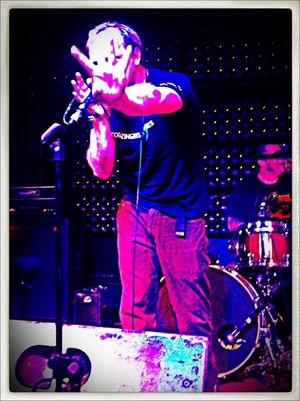Howdy, y’all! It’s another Friday in the World of the CoronaVirus, which means a slew of new releases for you to stream from the comfort of your own home. Today marks the American release of director Bruce McDonald’s DREAMLAND, reuniting him with PONTYPOOL co-conspirators Stephen McHattie, Lisa Houle, and writer Tony Burgess. Check out the trailer:
To call the film “weird” is to do it a disservice; it’s obviously weird. I know it, you know it, and they know it. “I like the space [Bruce] puts actors in when he’s working,” says Henry Rollins of McDonald. “Because it’s just fun and weird. So go have fun and be weird.”
I must admit that on my first viewing of the film, I didn’t quite get it. It was trying a little too hard to be weird, in my opinion, and it seemed to trudge along quite slowly. Truth be told, I fell asleep. In preparing for phone interviews with Bruce, Stephen, and Henry, I watched the film a second time and found that pass through to be far more linear. It’s right there in the title: DREAMLAND. The film is sleepy and blurry-eyed because it’s a dream. The characters are crude avatars of heroism, avarice, depravity, and innocence (with a vampire thrown in for good measure) because it’s a dream.
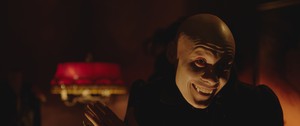
Stephen McHattie (300, WATCHMEN) is pulling double-duty here as Johnny Deadeyes, the grizzled, bedeviled hero of this fairy tale, as well as The Maestro, a Chet Baker ghoul who is kept as a prize trinket by the despotic Countess played by Juliette Lewis (THE OTHER SISTER, KALIFORNIA (with a “k” because it was the nineties)). He’s set to play the wedding of her brother, the vampire, played by Tómas LeMarquis (WAITING FOR ANYA), to a child bride furnished him by underworld small-timer Hercules, played by Henry Rollins (HE NEVER DIED, JOHNNY MNEMONIC), of whom he has previously run afoul. As Johnny’s employer, Hercules demands The Maestro’s finger as penance for a slight, but this request comes at the same time that Johnny is questioning their working relationship and considering a coup of his own. His rebellion doesn’t go without its hiccups, which makes him a man on the run from child assassins, assisted by Lisa the Killer (McHattie’s wife Lisa Houle) and the quirky couple that runs what seems to be the only pawn shop in town. All this plays out on the picaresque cobbled streets of Luxembourg while Johnny is haunted by bloody visions. Oh, and did I mention there was a vampire? ‘Cause why the fuck not, right?
“Think... Weinstein,etc,” quips McHattie. “I think we’re well-supplied with vampires right now. They seem to be sucking the life out of everything. So it didn’t seem like much of a stretch to literally put one in. Everybody just acts like ‘Oh, yeah…’”
If this sounds a bit too ambitious, well, it is. I regret to say that DREAMLAND doesn’t really work as a movie, though that is not to say it’s not worth watching. Stephen McHattie is transcendent, Henry Rollins is explosive, Juliette Lewis is manic fun, and Tómas LeMarquis is having way too much fun as the vampire. “When we first met he said ‘I’ve got this idea, Bruce of how I’d like to play the vampire,’” recounts McDonald. “‘What if this vampire, and this girl that he’s marrying… it isn’t about morality, it’s about chocolate cake. It’s like he’s getting a big chocolate cake, and he’s so excited, so delighted; just can’t wait to eat this chocolate cake.’ And it was with that notion that the vampire came alive.”
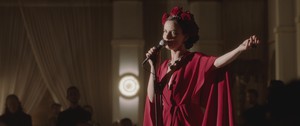
As I said, the film works better on a second viewing, but that requires the viewer want to see it a second time, which I can’t confidently say will be the case 100% of the time. I do however recommend this movie for the amazing performances, the strange imagery that will stick with you long after the screen has faded to black, and just because Bruce McDonald is such a darn likeable guy. Not to mention the amazing music by Jonathan Goldsmith, which I didn't even get a chance to discuss with Bruce because we had so much fun talking about the rest of the production.
I got the chance to chat with director Bruce McDonald, as well as stars Stephen McHattie and Henry Rollins about DREAMLAND and the current state of affairs.
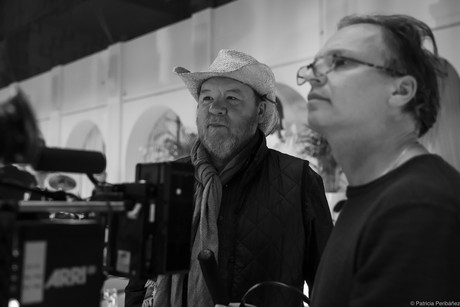
Eric McClanahan: Good afternoon, how are you?
Bruce McDonald: Great.
EM: So I just got finished watching DREAMLAND a second time. I found a second viewing lends a lot more of a linear storytelling aspect to the film. I’ve done some research and I see the same logline/synopsis everywhere I look. I’d love to hear your elevator pitch for the film.
BM: Sometimes I like to call it, if I were to label it, a EuroTrash Jazz Western, which makes me smile. Somebody at some festival said it was kind of like a western in a weird sort of way and he was kind of right, you know? The redemption arc. But as far as plot, if I’m like talking to my sister’s friends or whatever I’d say okay, well, it’s about an contract killer who gets hired by his underworld boss, named Hercules, who runs a club called the Al Qaeda, to go and cut off the finger of Chet Baker before he plays the wedding of a vampire and his child bride at the countess’s palace. And that’s about the tightest encapsulation I can make of the plot. What it is… is still unraveling.
EM: I think it’s a film that you give to the viewer and they decide what it is once they’ve viewed it through their lens. I really liked it. I thought Stephen McHattie put in amazing performances as both Johnny Deadeyes and The Maestro. The little mannerisms he gave the characters, such as the Maestro always keeping his hands before his chin and always looking off…
BM: Yeah, like when he lights his cigarette but backwards. He’s got these little kind of scratchy things, always scratching his face or his hand. It was all great research that he’d done on Chet Baker, he’s… you know, I’ve worked with Stephen a bunch of times and it’s always a delight; he always surprises you, and he does his homework, you know? Even little things, like when we were preparing, the hair became really important to him and there was this big decision that “Johnny should have long hair” and I thought he was really obsessing but I saw how important this was, especially in this case where he was defining two different characters. But in general for the actor, any actor, those things are important. I mean everyone has a different process but it really just felt like I had a front row seat to a master class in acting watching him do his stuff. You know, I’m the director, but I’m more of a “more of this, less of this” but not much. We talked about the script and a couple of things but being so comfortable, having worked together enough, like there was this great handoff. “This one’s for you, Steve. Like, I’ll watch you with what needs to be watched, but let’s see you go.”
EM: I think a role, or roles, like those, are easy to overdo or mess up, and drive into parody, and I think that does speak to his preparation and what he brought to it. Just amazing work.
BM: I’m going to pass that on to him, give him a call later, and pass that on to him because I think he’d love to hear that.
EM: I think he’s been largely underappreciated and I think, particularly in this film, he’s an amazing talent.
BM: He’s one of the best, man. He’s great.
EM: So, the script. You’ve worked with (Patrick) Whistler and (Tony) Burgess before, so where did this story come from?
BM: Well weirdly, it came from sort of two places. We’d all worked together; me, Stephen, Lisa, and Tony on a film called PONTYPOOL, a kind of zombie movie, I guess, and at the very end of the credits; we were going to end the movie with this little scene but the producer thought it was too weird so we put it at the end of the credits. In it, they appear, Stephen and Lisa, as Johnny Deadeyes and Lisa the Killer, in this diner talking about “kicking boots in the free world,” which is like gangster talk, like Raymond Chandler kind of talk, for about forty seconds, then it ends. So there was that and then was this short film that Stephen made where he plays Chet Baker. So when we finished all working together on PONTYPOOL, it was like, we didn’t want the band to break up; we had a riot. So we thought “we should try to do something together” and I thought “well let’s make something for Steve; let’s write for him and Lisa” and Tony kind of used those two elements and brought the killer and the vampire and the countess and all that appeared and we worked on it for a while and Steve would check in and give his two cents and Lisa was very helpful and that’s how it began. I guess the impulse was always like “what can we do to work together again?” and that’s what we came up with.
EM: Well, I love the sense of community; I think it really shows through on the screen. I got to see Tómas LeMarquis earlier this year in a historical film WAITING FOR ANYA where he plays a vicious Nazi captain. His portrayal of the vampire in this film is so night-and-day from that. He had so much fun in that role. Tell me how he came aboard the production.
BM: Well the other screenwriter, Patrick, brought Tómas to my attention and I watched for him in BLADE RUNNER 2049, he had a little part in that; I haven’t seen the one you talked out, I’d love to see that. Anyway, we contacted him, he said great. When we first met he said “I’ve got this idea, Bruce, of how I’d like to play the vampire; I don’t know if you’d like it or not” because probably up until then I’d thought of, like, Bela Lugosi as the vampire; just a regular sort of vampire in the story. Then he said “what if this vampire, and this girl that he’s marrying… it isn’t about morality, it’s about chocolate cake. It’s like he’s getting a big chocolate cake, and he’s so excited, so delighted; just can’t wait to eat this chocolate cake.” And I said “Tómas, that sounds great!” And it was with that notion, I don’t know if it was exactly chocolate cake that he said but it was something like that, the vampire came alive. It was a delightful, wonderful character. There was still as sinister-ness to him because of the costuming and he’s got the great look and the teeth. I was floored. It was so unexpected, to me, but it seemed to make sense to me, and it certainly made sense to me. And then he told me “you know ever since I was six years old I always wanted to be a vampire” so this was kind of a bit of – he was also excited to be the vampire. Like the part, to him, was like chocolate cake. So it was a surprise, which is kind of what I like to do with actors, in a way. They might have a completely different idea than me and if they’re saying “this is the way I want to go” then I say “I’m not going to stop you” as long as the narrative works in the story and it all kind of adds up. That’s the delight of working with these fearless actors like Stephen and Tómas and Juliette; they just… leap, and there’s a fearlessness, and they don’t know if it’s going to work, but their gut tells them “I made this choice, so can I go for it?” and I say “yeah go for it.” And if it’s totally stupid, I’m the first audience, and I would tell them “listen, let’s maybe turn that chocolate cake into a glass of bourbon or something, or whatever that object of desire is.” But most of the time, I’d say ninety-fucking-five percent of the time, actors are really smart storytellers, the good ones, anyway, and if you let them off the leash – you know sometimes you’ll see something on television or otherwise that’s bad and you feel that the actor has been told what to wear, what to say, where to stand, where to go, what time to show up and when they get a chance to own it, to say “how about let’s be partners in this decision, I’m not here to just be a monkey boy and do it the way it’s supposed to be” and when there’s that sense that it’s their creation, as well, fuck, man! They’re going a hundred and fifty percent and it’s a treat. And then my job is, again, front row seat at the Acting School. It’s so much fun! I just give them permission, a little bit of guidance, and appreciation, and if you’re lucky, it comes together.
EM: There’s a great juxtaposition with his almost childlike view of the world and the bride and it brushes up against that very disparate view that Johnny and The Maestro have and it created that sense of “Dreamland,” I thought.
BM: Yeah, the idea of the dream was that I let the design and the production team sort of leave the door to the subconscious open, let’s keep the Dream Door open so we don’t second guess ourselves and we don’t try to explain things. So we could have these collisions that don’t really make sense to be in the same place but in a dream they totally make sense. Like you might have a dream where you and Albert Einstein are having martinis with Joe Strummer or something and it would totally make sense but if you thought about it, it really doesn’t make any sense. That was sort of the fun of making this film; it comes from Tony, who was the beautiful madman that designed and wrote this and he was the one that insisted on not explaining things like why is there a vampire or why is there two guys who look the same? No, we’re not here to explain. They just arrive and through our score and our editing we try to give it that sense of propulsion so that it doesn’t feel fractured; it feels somewhat whole. It was kind of a crazy experiment, and you just don’t see films like that very often. I’m not saying it’s any better than other films, it’s just kind of crazy; it’s hard to be crazy these days because everybody wants it all fucking nailed down and there’s a lot to be said about that. But every once in a while it is nice to go a little crazy and I still can’t believe we got to make this; it’s just one of those things that’s not really allowed.
EM: So, Bruce, tell me about working with Henry Rollins. I’ve been a fan for generations, and the magnetism he brings to Hercules – he’s like a little boy playing mobster. Tell me about that experience.
BM: Well, I gotta say, Henry is one of my favorite humans. I was a little intimidated to meet him and it was, like, wow, you couldn’t ask for a better teammate, a better ally, a better pal, a better collaborator. He was just, like, ready to go, and yeah, being the junior actor he was a bit nervous with McHattie; McHattie can be very intimidating, so he made it a keen effort. I don’t know what to say. He was a delight. He’s fun to play with. He would always say “I can go again.” You know, he’s done other acting and he really likes it, he says he really wants to do more. I think he really had a good time. It was a big bite for him to take but I’m very proud of him. I think he did a great job. I don’t know, man. He’s fucking on the team, man. I want to keep working with Henry because he’s just such an impressive guy. Kind-hearted and generous, intelligent. A bit of a shock, actually. I mean, I’d met him years ago on this other show and we got our connection, so when I phoned, because I thought of him from the beginning for this and he said, right away, like “yes, I’m on it!” and we knew each other a little bit and he knew we had fun last time and he knew this time would be a bigger challenge for him and it was great and I hope to continue my Henry Rollins brotherhood. I’m a big fan of his, a big admirer of his. I just can’t get enough of him. I’ve seen his spoken word shows, I’ve read his column, he’s got a radio thing now. He’s the man; what can I say?
EM: Well, seeing what you guys have put together with this I do hope you guys keep working together and I wish you best of luck with DREAMLAND and thank you so much for talking with me today.
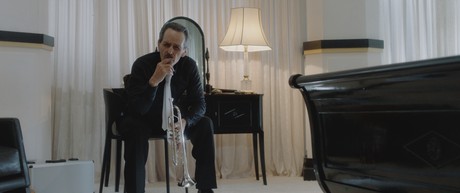
EM: So I got to talk to Bruce McDonald already and raved about your performance as both Johnny Deadeyes and The Maestro and he used the name “Chet Baker” before I got a chance to. How much of Chet Baker was the influence for The Maestro character?
Stephen McHattie: Well, you know the whole thing, the movie came out of two things. First the Coda that we put on the end of PONTYPOOL. There’s a little scene at the end which is basically just the two main characters together. And we did that ‘cause we didn’t want it to end in a big hellfire, everybody dies, end of the world; didn’t want it to be that kind of movie, right? We wanted the characters to kind of go off into another place. And we always wanted to make some kind of sequel to PONTYPOOL and developed a bunch of different scripts and tried to get them going and couldn’t. Then I did a little five-minute movie with a writer/director called Robert Budreau (THE DEATHS OF CHET BAKER, 2009); you know, Chet Baker was found on the pavement below his hotel room in Amsterdam and they never established if he was murdered or a suicide or an accident where he fell out. Well, Bruce saw that movie and we just kind of took off from there with writing the script. So that was kind of how the trumpet player appeared.
EM: I thought it was fantastic, and particularly when you started singing at the end, I knew “oh, this is totally Chet Baker.” That song, arranged by Jonathan Goldsmith, Annie Lennox, “I Saved the World Today” was a beautiful performance. I really enjoyed that.
SM: Thank you.
EM: Tell me about playing against yourself. The diner scene with Johnny Deadeyes and The Maestro. How surreal was that?
SM: I kind of felt like, you know I did a lot of theater in New York when I was starting out, the first twenty or thirty years I was working, so it kind of felt more like theater. You know ‘cause in a movie you have, first, somebody playing opposite of you and everything’s filled in. And then it was a matter of, doing the scene with a stand-in, doing one side of the scene, and then you switch places. Clean up, and re-costume, do all the makeup and stuff. It was great fun doing that. The only hazard was, actors are actors, and they always want to do something better than you did.
EM: Bruce mentioned it was your idea for the Johnny Deadeyes character to have long hair. What was your interpretation of Johnny? Where do you think he came from?
SM: Who do I see him as? Well, more of a working-class kind of guy, a real street guy, who kind of worked his way into a niche of steady employment. He’s just a working guy who does his job well and tries not to be bedeviled by the consequences of what he’s doing. Kind of a fallen creature, but he kind of wakes up and realizes that more is being asked of him than he ever imagined doing. Sort of a guy with a steady job, knows what he has to do; it becomes routine, he’s good at it, and then you get asked to do something that you can’t stomach. So, yeah, that was kind of how I saw it.
EM: Your scenes with Henry Rollins… I love the dichotomy. How broken, or ground down, Johnny Deadeyes seems compared to Hercules’s kind of childlike play. How was your dynamic on the set with Henry?
SM: Oh it was great! Yeah. You know Henry was willing to go as far as he could, and he and Bruce got along great so it was terrific.
EM: The film has already premiered overseas and is preparing for its American release on Friday, June 5th. What do you hope American audiences find in this film?
SM: A movie! I was working with a Palestinian director last year and he was complaining that the PR department wanted him to do publicity for the movie, right as he was in the middle of shooting it, and he kept telling them “I have no idea if I have a movie until I start cutting it. I don’t know how to talk about it.”
EM: Well I watched DREAMLAND twice and I noticed that on a second viewing its far more linear and it’s charmingly absurd. I love LeMarquis as the vampire. How did all these wild pieces come together.
SM: Think… Weinstein, etc. I think we’re well-supplied with vampires right now. They seem to be sucking the life out of everything. So it didn’t seem like much of a stretch to literally put one in. Everybody just acts like “Oh, yeah…”
EM: So what are you working on next?
SM: Well I was supposed to be doing a little part in a Guillermo Del Toro thing called NIGHTMARE ALLEY, but, uh, everything seems to be postponed right now. You may have heard. So who knows when it’s going to kick back up again and it what form it’s going to be. You know, it’s hard to get money together. Who knows? I was hoping you would have a crystal ball and you could tell me.
EM: That’s why I’m asking everyone I can. So my next call is with Henry Rollins to talk about DREAMLAND.
SM: Oh, tell him I said Hi.
EM: Yeah, I was going to ask if you had any messages for him.
SM: Oh just give him my love.
EM: Any set stories that I shouldn’t know about.
SM: Not from me.
EM: Good man! Thank you so much for talking to me about the film today.
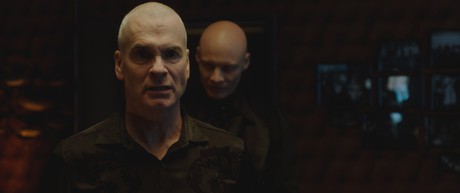
[Please note that I never abbreviate Henry Rollins’s name because he’s Henry Fucking Rollins]
EM: Good afternoon, Henry. How are you today?
Henry Rollins: Oh, I’m fine. How are you doing?
EM: I am fantastic. Thank you for asking. So let’s get right to it. We’re talking about DREAMLAND. You play – actually, let me start from the beginning. This came across my desk and they said that you were attached, Stephen McHattie, Juliette Lewis, Bruce McDonald was directing. The logline was “on the night of the strangest wedding in cinema history, a grotesque mob boss asks an aging hitman for the finger of a drug-addled fading jazz legend.” That sound about right?
Henry Rollins: Yeah, pretty cool, huh?
EM: Yeah, so I read that, and I thought “Okay, so Henry Rollins is in this. I can see him as any one of those characters.”
Henry Rollins: Well, thank you. I have not a fraction of that versatility but I thank you anyway.
EM: Well I purposely didn’t watch the trailer so I could be surprised when I sat down to watch the film, and your turn as Hercules was oh, so much fun!
Henry Rollins: Oh wow! Thanks!
EM: So how did you come across this script?
Henry Rollins: This is actually the third thing I’ve done with Bruce. We’re solid pals on our third decade of friendship and I honestly like the guy. He’s so great to be around. And I like the space he puts actors in when he’s working, ‘cause it’s just fun and weird. So go have fun and be weird. And I don’t necessarily associate Hercules, The Character, with fun, but in order to get there, to be explosive and horrible, you have to kind of relax, be like “okay, this is going to be really gross; let’s do it.” He’s an awful person, I mean, the best thing that happens to him is when he gets killed. He’s a child trafficker, and there’s no room on the planet for a guy like that. And he thinks everyone loves him, and he finally gets to be with the big folks uptown. It’s his big night! It’s his entre to upper-Manhattan, and everyone hates him; everyone cringes. He has no idea, he has no idea, and he’ll never have any idea. So I had to get myself into the mindset of playing someone hopefully I don’t resemble too much, and I did it. Bruce contacted me and said “Hey, man! I’ve got this thing. Look this over and let me know.” There was no audition. And so I talked myself out of it, and then talked myself back into it, because at first it just seemed like more than I could handle. And, so, Bruce and I got on the phone and I asked “So, can I wear you out for like five minutes describing what I think Hercules is” he said “go!” So I gave him this kind of like MRI of Hercules, down to, like, how he got his name and he went “I like all of that. Bring all that with you.” And I said “You know I’m not an actor; I’m just a ham.” He said “Don’t worry about that.” He didn’t say no, he said “I know you’re not, but we’ll get there. I got this. And I know you can do it.” And I said “O—kay, ‘cause I WANT to do it.” I just don’t trust myself in big-acting stuff because I’m so not an actor and so I said “Okay, man. I want to be with you, and I want to do this thing” and so once you say yes you start to sell yourself the rest of it. By the time I got there, I’d been rehearsing, a lot of laughing, those big laughs of his that kind of come out like a Heimlich out of him, so I had to train myself to do that deal and make it believable. So by the time I got there I was kind of worn in and I got with the other actors and we kind of “hit it” and then, Bruce with his excellent steerage got me the rest of the way there. There wasn’t a day where I walked away thinking “Oh well, that bombed.” I thought I put it across pretty well, for me.
EM: What I got from Hercules is that he has this very childlike audacity, that he’s playing at being a big-time adult, almost Trumpian, in a way. Did I read that right?
Henry Rollins: Yeah, absolutely! Arrested development. He’s like Sadaam’s bad son; which one of those? I forget which one. They’re awful people. Like the dad may have been real player, a cool, calm Vito Corlione-type, but the son is a monster, because none of the father’s intelligence or talent or ways to negotiate and keep the peace, so everywhere he goes he lights it on fire, he blows it up, he insults, he kills, and he has no idea how awful he is. And you could say “you’re amoral,” and he doesn’t even know what that means. You know, he’s that dangerous, because he doesn’t understand. And he thinks that if you get to go uptown and be with the big folks, that’s the final grace; like you are now one of those people. Dude, you’re never going to be one of those people! They’re never going to let you in! And that reminds me of some elected officials in the world today. They’re from another borough and they’re never gonna get there. So they try to buy their way in and still everyone goes blech! “Well, I’ll buy the right paintings.” Blech! “Do not come to the gallery, please.” And he’s that guy! He’s like “It’s our big night! We’re going uptown!” For him, he thinks this is it. It’s his big night. And his expectation is unreasonable but his enthusiasm for it, it’s the only real thing about him. It’s the only not-horrible thing about him. Like at least he can wag his tail. So I tried to have that come out, like unabashedly fanboy on this night, like he’s going to get knighted, you know?
EM: He was so pure in his innocence, in that moment. Like the scene with the tuxedo, where he’s rehearsing in the mirror, was that on the page, or did you bring that?
Henry Rollins: Yeah, it all came from the page. I don’t know what take was kept of any one scene, but when the assassin leaves the room, and I say “Go get me that finger, shooter!” Something like that, I say like “Come on! Alright, shooter; go get me what I want.” I just added that on so there wouldn’t be a bunch of silence with an actor with his back on me. I just wanted to fill that in, knowing that in post they could lose it. But, other than that, I’m one of those who stays to the script. I don’t presume that I could bring anything more than the writer or the director could, so I’m not going to be the one’s that going to get dressed down. I’ve been around directors like that. “What the – did you think you were doing?” Okay, that’s not going to happen to me; I’ll let it happen to that actor. So I stick to the script religiously, unless, like, I’ve been told, “Okay, we’ve got the one, now let’s do one for you.” Like that film I was in HE NEVER DIED, that was one where Jason (Krawczyk) said “Alright, we got it. We’re good. You got an idea?” I said “Yeah, I got a- can we go one more?” And he said “Okay, this one’s for Jack.” And I would do one where I would do one where I would do a thing here or there, a little bit different, and more often than not the director would go “and that’s our keeper, there, thank you.” And I’d say “whoa, are you kidding? Thank you!” And so that became a norm if we had time. It’d be “okay, we’re good. Jack? You got one?” “Yeah,” or “no; your idea was the thing. You know, I got no more icing to put on it.” But Bruce is absolutely cool with letting people play. It’s been two and a half years since we shot it and quite honestly I’m not remembering when, or if, we ever had any of those moments. My character, as you saw him, kind of hits the wall pretty hard. You know, a lot of yelling. “I want his head!” There’s a lot of – you can’t get more over the top. What, scream louder? I gave you all the decibels my fifty-something year-old body could muster. So I kind of, you know, he’s over the top. The whole movie’s over the top; the whole thing is weird. So I just acted until I was told to pull it back. And there’s that one scene where I’m yelling at my girls… even I pulled that back. I was like, “whoa whoa… maybe don’t start yelling at the beginning of the scene. I’ll hold that for that later.” He said “yeah, try that.” So we kind of dove into “Ah, I want his head!” There was a little restraint knowing I’ll always add too much to anything because I’m that guy, so I’m usually the one who has to cool it so everyone else can get what they need to get done, done.
EM: There’s a scene when you do lay a hand on Johnny Deadeyes early on in the film, and that slap is so fluid, so explosive. Did you and Stephen rehearse that? How did that come about?
Henry Rollins: Yeah, any kind of physical stuff, I’m not trying to tell you what this is all about ‘cause I’m not one who knows, but anything physical or any punches, slaps, hugs, anything, you rehearse, rehearse, rehearse. Because with even the slightest gesture it’s easy to get hurt. And I’m honestly not remembering but there’s no way, ‘cause McHattie’s a stone-cold pro. I’m sure there’s nothing we didn’t rehearse when it was physical. I’m not accurately remembering, but I’m kind of just going by my 101. Because there’s a lot of stuff; there’s a moment where I punch a girl, and I’m not looking to hurt anybody. All that stuff gets, with any prudent director or stunt coordinator, you’ll take the time. ‘Cause I’ve seen people get hurt because someone just tried something and didn’t tell the other guy or the director, like “Whoa! You just punched that dude!” Like a solid hook to the jaw. Wasn’t me, but I was on the receiving end of one once, and wow! The guy had mitts like UPS trucks. And I was just “that, okay, I got to find my jaw; hold on, before we do another take.” Like my head has to come back to life because he just kind of threw that one in.
EM: Yeah, I can see that. It was just so jarring, so fluid. I just got off the phone with Stephen about twenty minutes ago and he said to say hello.
Henry Rollins: Oh, okay. You know, he’s a real pro, and both characters he played are these steely, low-key, keep-it-to-yourself kind of guys, and he stayed like that the whole time. At lunch, he wasn’t like, “Hey, you guys, that was a crazy morning!” He was more like “hi.” And so I never knew; I’d go to Bruce and say “Uh, he and I are cool, right?” And Bruce would say “Oh, no; yeah. He says he likes working with you.” “Okay.” ‘Cause I can’t tell. Like, am I pissing him off? I never knew if I was okay with that guy. Ever.
EM: “He’s giving me nothing, man!”
Henry Rollins: He’s a good dude, and I’m glad he said hello, ‘cause I left that film, I finished thinking “Oh, that guy doesn’t like me.” I had no idea!
EM: Nicole said we have one more question so I have to ask what are we looking for next from you?
Henry Rollins: Well, in this downtime, because for the most part all my tour dates and all my big travel plans went away, so for the rest of my year I’m just kind of doing, which is a new book for December. So, I mean, you’ve written up copy; it takes up all the time you can give it, so I’m just doing double-shifts. I’m about to hand in the copy edit version of my book to the copy editor hopefully in the next ten days. So I’ve just been working on that. Two trips to the post office every week. One trip to the grocery store every ten days. I live in a home where I have a gym, an office, a studio, so my radio show keeps going, podcasting keeps going, my book work keeps going. I’m just doing my thing, with three experiences a week in the outside world, but otherwise, besides all my shows evaporating, I’m just kind of doing what I would be doing this month anyway. I was supposed to be in Uganda… nowish? Like at the end of this month; that went away. So I’ll just finish my book two weeks earlier, which we love as far as scheduling goes. So I’ve just been working away, and I answer that question carefully because I don’t want you to think I’m making light of what’s happening in the world. I just happen to be luckily placed in an environment where I can actually get things done. Because I’m not dependent on my factory being open or the coffee shop where I work at being closed. So, I’m self-employed, and that’s one of the upsides of being self-employed is that I can kind of eke out an existence and get in a day of work right here at the house.
EM: Well I’m looking forward to it. I’m a big fan so I hope that everything turns out great.
Henry Rollins: Well, thank you, sir.
EM: Thank you so much, have a great day!
Henry Rollins: Thank you.
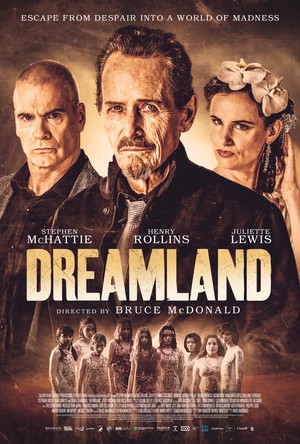
DREAMLAND is available today on Video on Demand and Digital HD.
Until next time, stay safe and stay sane!
-McEric, aka Eric McClanahan
